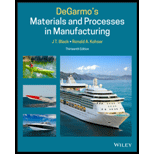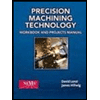
Degarmo's Materials And Processes In Manufacturing
13th Edition
ISBN: 9781119492825
Author: Black, J. Temple, Kohser, Ronald A., Author.
Publisher: Wiley,
expand_more
expand_more
format_list_bulleted
Question
Chapter 31, Problem 9RQ
To determine
The method of controlling the pitch on a lathe while thread cutting.
Expert Solution & Answer
Want to see the full answer?
Check out a sample textbook solution
Students have asked these similar questions
Show work if any equations or calculations are used.What is the main alloying element and carbon percentage of SAE-AISI 4621 Steel?
The particle has a mass of 0.5 kg and is confined to move along the smooth
horizontal slot due to the rotation of the arm OA. Determine the force of the rod
on the particle and the normal force of the Isot on the particle when 0 = 30°.
The rod is rotating with a angular velocity of ė = 2rad/s and an angular
acceleration of = 3rad/s². Assume the particle only contacts one side of the
slot at any instant. To check your answer, please enter the normal force of the
slot onto the particle in Newtons.
A
* = 2 rad/s
-0-
0.5 m
Solve, use engineering economic tables
Chapter 31 Solutions
Degarmo's Materials And Processes In Manufacturing
Ch. 31 - How does the pitch diameter differ from the major...Ch. 31 - Prob. 2RQCh. 31 - Prob. 3RQCh. 31 - Prob. 4RQCh. 31 - Prob. 5RQCh. 31 - Explain the meaning of 14 -20 UNC-3A.Ch. 31 - Prob. 7RQCh. 31 - Prob. 8RQCh. 31 - Prob. 9RQCh. 31 - Prob. 10RQ
Ch. 31 - Prob. 11RQCh. 31 - Prob. 12RQCh. 31 - Prob. 13RQCh. 31 - What is the reason for using a taper tap before a...Ch. 31 - Prob. 15RQCh. 31 - Can a fluteless tap be used for threading a hole...Ch. 31 - What provisions should a designer make so that a...Ch. 31 - What is the major advantage of a spiral-point tap?Ch. 31 - Prob. 19RQCh. 31 - Is it desirable for a tapping fluid to have...Ch. 31 - How does thread milling differ from thread...Ch. 31 - What are the advantages of making threads by...Ch. 31 - Prob. 23RQCh. 31 - Prob. 24RQCh. 31 - What is a fluteless tap?Ch. 31 - Why is the involute form used for gear teeth?Ch. 31 - What is the diametral pitch of a gear?Ch. 31 - What is the relationship between the diametral...Ch. 31 - On a sketch of a gear, indicate the pitch circle,...Ch. 31 - What five requirements must be met for gears to...Ch. 31 - What are the advantages of helical gears compared...Ch. 31 - Prob. 32RQCh. 31 - What difficulty would be encountered in bobbing a...Ch. 31 - What is the only type of machine on which...Ch. 31 - Prob. 35RQCh. 31 - Why arent more gears made by broaching?Ch. 31 - What is the most important property of a crown...Ch. 31 - What are three basic processes for machining...Ch. 31 - Which basic gear-machining process is utilized in...Ch. 31 - When a helical gear is machined on a milling...Ch. 31 - Why is a gear-hobbing machine much more productive...Ch. 31 - Prob. 42RQCh. 31 - What are the advantages of cold-roll forming for...Ch. 31 - Prob. 44RQCh. 31 - Under what conditions should shaving not be used...Ch. 31 - Prob. 46RQCh. 31 - Can lapping be used to finish cast iron gears?Ch. 31 - What factors are usually checked in inspecting...Ch. 31 - What are the basic methods for gear finishing?Ch. 31 - A hob that has a pitch diameter of 76.2 mm is used...Ch. 31 - In Figure 31.17, a form-milling operation and...Ch. 31 - A gear-broaching machine can complete the gear in...Ch. 31 - Prob. 4PCh. 31 - If only three gears described in Problem 4 were to...Ch. 31 - Based on the size and shape of the product,...Ch. 31 - What type of engineering materials might be able...Ch. 31 - Prob. 3CS
Knowledge Booster
Learn more about
Need a deep-dive on the concept behind this application? Look no further. Learn more about this topic, mechanical-engineering and related others by exploring similar questions and additional content below.Similar questions
- Solve, use engineering economic tablesarrow_forwardQu 2 Calcium oxide (CaO) a white, caustic, alkaline solid that reacts vigorously with water to produce calcium hydroxide, releasing heat in the process. It is used in various industrial applications, including cement production and water treatment. The ionic radii of the ions are: TCa2+= 0.100 nm and roz-= 0.140 nm. On the basis of this information answer the following questions:Number 1 through 4 I need to show all work step by step problemsarrow_forwardShow work if any equations or calculations are used. Assuming hole basis, find the shaft and hole dimensions for a sliding fit using a basic hole size of 20mm. Show the max and minimum size for both hole and shaft. Utilize the equations and tables in the appendix.arrow_forward
- Show work if any equations or calculations are used. A milling machine is equipped with a 1” diameter end mill. During a facingoperation, the spindle is running at 275 RPM. The depth of cut is 0.04” and linear feed rate is 2” per minute. Find: (a) Cutting speed, (b) Material Removal Ratearrow_forwardL1 = 5.7m, L2 = 1m, L3 = 1.2m, L4 = 1m, L5 = 0.2, L6 = 0.5m, v2 = 4.8m/s. The solutions should include, but not be limited to, the equations used tosolve the problems, the charts used to solve the problems, detailed working,choice of variables, the control volume considered, justification anddiscussion of results etc.If determining the friction factor, the use of both Moody chart and empiricalequations should be used to verify the validity of the valuearrow_forwardPlease identify the marked points of the stress-strain curve (Write on graph next to corresponding letter) Stress, σ A D (slope of line) B. C Strain, &arrow_forward
- r Q2. A bracket is attached to a vertical column by means of six identical bolts as shown in Fig. 1. It is subjected to an eccentric force of P-80 kN at a distance of 200 mm from the center of column. What is the magnitude of maximum shear force and which bolt carry it? P= 80 kN 200 Fig. 1 1 2- 75 6 30 75 → 5 .5 1- 50 10-50-1arrow_forward3. The attachment shown in the Fig.2 is made of 1040 HR. The static force is 30 kN. Specify the weldment (give the pattern, electrode number, type of weld, length of weld, and leg size). 30 kN Fig. 2 500 All dimension in mm 100 (15 marks)arrow_forwardฉันต้องการหา อุณหภูมิสุดท้ายของกระบวนการนี้และงานของกระบวนการนี้มีค่าเท่าใดarrow_forward
- The pressure and temperature at the beginning of compression of a cold air-standard Diesel cycle are 100 kPa and 300 K , respectively. At the end of the heat addition, the divssure is 7.2 MPa and the temperature is 2050 K . Assume constant specific heats evaluated at 300 K . Determine:(a) the compression ratio.(b) the cutoff ratio.(c) the percent thermal efficiency of the cycle.(d) the mean effective pressure, in kPa .arrow_forwardQ3. Determine the reaction force at A and force P applied at 45° to the horizontal just necessary to start a roller 100 cm diameter over an obstruction 25 cm high, if the roller weighs 1000 N, as shown in Fig. 3. Fig. (3)arrow_forwardCorrect Answer is written below(preferably handwritten solution) . Detailed and complete fbd only please. I will upvote, thank you.arrow_forward
arrow_back_ios
SEE MORE QUESTIONS
arrow_forward_ios
Recommended textbooks for you
 Precision Machining Technology (MindTap Course Li...Mechanical EngineeringISBN:9781285444543Author:Peter J. Hoffman, Eric S. Hopewell, Brian JanesPublisher:Cengage Learning
Precision Machining Technology (MindTap Course Li...Mechanical EngineeringISBN:9781285444543Author:Peter J. Hoffman, Eric S. Hopewell, Brian JanesPublisher:Cengage Learning

Precision Machining Technology (MindTap Course Li...
Mechanical Engineering
ISBN:9781285444543
Author:Peter J. Hoffman, Eric S. Hopewell, Brian Janes
Publisher:Cengage Learning
HOME SHOP JIGS & FIXTURES PART 1, TYPES OF JIGS & ACCESSORIES AND THE THEORIE BEHIND THE TOOLS; Author: THATLAZYMACHINIST;https://www.youtube.com/watch?v=EXYqi42JimI;License: Standard Youtube License